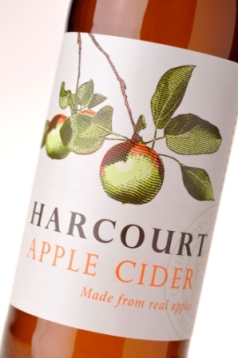By James Atkinson
Two veteran cider-makers from Victoria's apple producing heartland have launched a mainstream cider they are hopeful will take market share from some of the category's major players.
Harcourt's Drew Henry (pictured below right), who founded cider label Henry of Harcourt 14 years ago, along with Adam Marks, of Bress Wines Cider and Produce, have started Harcourt Perry and Cider Makers.
Like the 'real' cider made under their own labels, the new Harcourt brand's output will consist of cider produced using real apples and pears sourced from local growers.
But Henry says the new brand will be "taking on Strongbow", with its artifical carbonation and sweeter taste profile likely to appeal more readily to the mainstream consumer.
Marks is at pains to point out the clear differences between 'ciders' he believes bear closer resemblance to alcopop substitutes and ciders made from real apples or pears, which he and Henry both subscribe to.
"The fact that we're carbonating it is basically the only diversion we've made [from real cider]. I don't see it as being disingenuous at all," he said.
"What we're doing with Harcourt cider is we're using real apples, taking them to dryness, then resweetening it with fresh apple or pear juice depending on whether it’s the apple cider or pear cider."
The new label has to date produced over 90,000 litres of cider, which is now available in independent bottle shops in and around Melbourne – with national distribution hopefully around the corner.
It makes great business sense for Harcourt, which is highly exposed to hailstorms, droughts and floods, so there is always an abundance of inexpensive apples with blemishes that may preclude them from ever reaching a grocer or supermarket.
Henry and Marks hope Harcourt Perry and Cider will be a logical stepping-stone for drinkers away from other industrial, mass-produced ciders, towards more artisanal products like those produced under their own personal cider labels.
Marks' own Bress Bon Bon and Brut Ciders respectively contain 17 and 7 grams each of residual sugar and are both 10 per cent alcohol-by-volume (ABV).
These French-style ciders contrast sharply with some of the ciders on the market that may have anywhere up to 140 grams of residual sugar.
Henry says that before arriving at the taste profile of the new Harcourt ciders, which are five per cent ABV and have 40 grams of residual sugar, he and Marks benchmarked every commercially available cider on the market.
"I think we picked the sweet spot, which was a little bit sweet but not sickly sweet."

